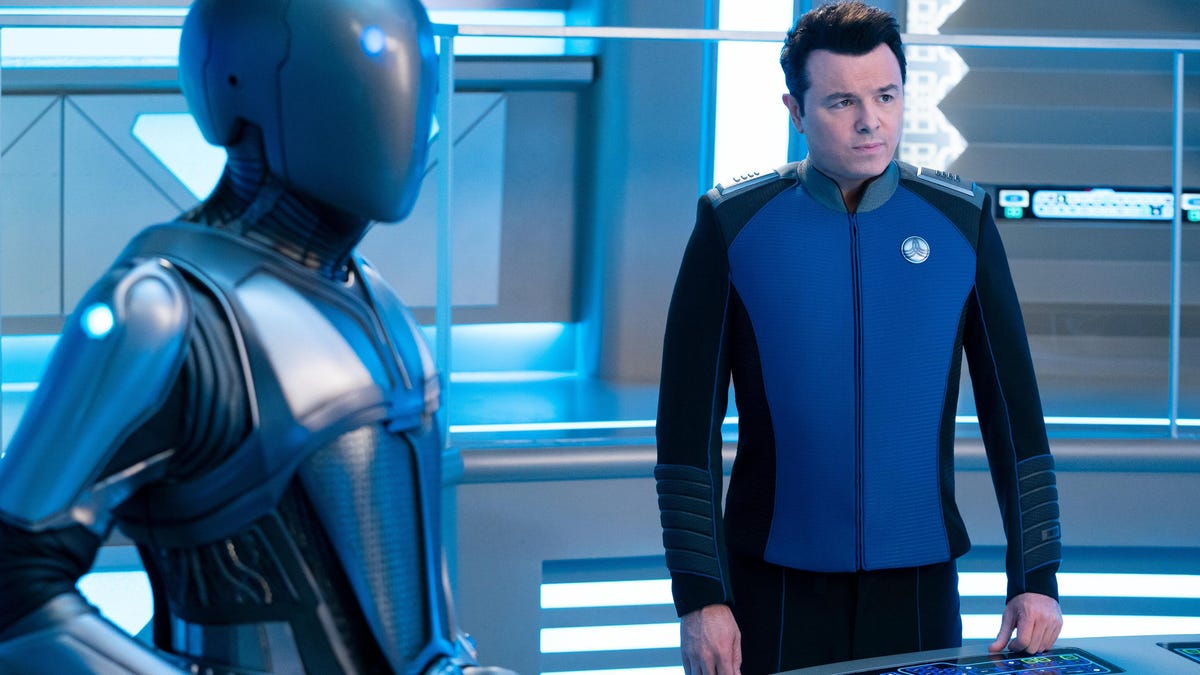Hulu's Star Trek-Like Sci-Fi Gem Is Now Streaming on Disney Plus
The Orville is must-see television for science fiction fans.

More people need to watch The Orville.
The Orville: New Horizons, the third season of Seth MacFarlane's sci-fi series, concluded last week on Hulu and makes its way to Disney Plus on Wednesday. What began life as a parody of Star Trek has evolved into a show that expands on the ethical dilemmas and social commentary the iconic sci-fi series was known for.
Plus, it has the kind of laughs expected from the creator of Family Guy and American Dad. There's still that love of Star Trek in every episode, but The Orville's maturation makes me enjoy it more than the series that inspired it. Both Hulu and Disney Plus subscribers can watch all three seasons to see the evolution of the show.
The series is set in the 25th century and follows the adventures of the starship USS Orville, which gets its name from Orville Wright of the Wright brothers.
MacFarlane plays Capt. Ed Mercer, who leads the ship with his second-in-command and ex-wife, Commander Kelly Grayson (Adrianne Palicki). Like Star Trek, the crew is made up of humans and aliens exploring the far reaches of the galaxy, but its characters are more modern, with plenty of human (or alien) flaws and behaviors. They straddle the line between the almost flawless, erudite crew of the Enterprise in the original Star Trek series and The Next Generation, and the more gritty and foul-mouthed characters of Picard and Star Trek: Discovery.
Episodes focused on ethical dilemmas and commentary about modern issues are what made me a Star Trek fan, and they are what's won me over as a fan of The Orville. There's a sentiment about The Orville that fans put this way: "The Orville out Star Treks Star Trek."
This third season really exemplifies the saying, with episodes focused on ethical problems that aren't so easy to answer, in contrast to the original Star Trek and TNG, which often trod more lightly or tied up episodes with a clear decision. Like the Federation's Prime Directive in Star Trek, The Orville's Planetary Union has its own rules to not interfere with the customs of other civilizations, and those regulations are put to the test constantly.
A perfect example of this is the penultimate episode, Domino, where crew members develop a weapon that can easily annihilate an entire race that's been hostile to members of the Planetary Union. This leads to the question of how to use such a device and, as expected, there's turmoil over the ethics of the weapon, leading to another dilemma.
#TheOrville New Horizons is now streaming on @hulu. pic.twitter.com/NDSpAjZNwY
— The Orville (@TheOrville) June 2, 2022
In another episode from season 3, Twice in a Lifetime, Lt. Gordon Malloy (Scott Grimes) gets sent back in time to 2015 after a mishap on the ship. Earlier in the episode, he'd showed his interest in this time period by carrying around a replicated smartphone and showing it off to the crew. He ends up living in the past for 10 years before the crew can find him in 2025. Viewers learn the Planetary Union has regulations for time travel: Stay put, don't interact with anyone in the past and wait for rescue. Gordon breaks the rules, leading to a dilemma over whether to destroy this tainted timeline and create an entirely different future.
One ethical puzzle from an earlier season involves Lt. Commander Bortus, who's part of the male-dominated Moclan race. In the first season, Bortus and his mate Klyden had a baby girl named Topa. What the crew found out is that the Moclan despise women so much that they change the sex of their girls, which Bortus and Klyden decide to do for Topa. The third season shows the ramifications of their decision on Bortus' family, the Orville's crew and in fact the whole Planetary Union. This scenario is similar to stories in The Next Generation, but not so much in the current batch of Star Trek shows.
For longtime Star Trek fans, the franchise holds an important place in our hearts. It always presented a brighter side of the future, where the world comes together for the betterment of humanity. But then the current iteration of the franchise seemed to view that aspect of the show as milquetoast, focusing on space battles instead of what fans really want: a future version of humanity solving problems not so different from what humans deal with today.
The Orville, however, has taken on this challenge. It gives viewers thought-provoking yet memorable scenarios that make viewers question their own morals and ethics, which is what a sci-fi fan should expect from a show about a utopian future. This made me a fan of The Orville, and it's also the reason I prefer the series over the current batch of Star Trek offerings. Hopefully, other people will come around to enjoying the show just as much.

